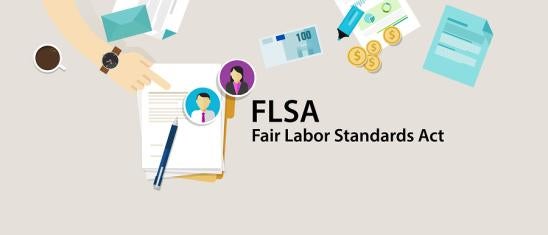


 Fair Labor Standards Act FLSA DOL guidance" width="548" height="235" />
Fair Labor Standards Act FLSA DOL guidance" width="548" height="235" />
The U.S. Department of Labor (DOL) continues to be very active in providing information to the public. Last week, the DOL issued new optional forms that employers can use for the administration of leave under the Family and Medical Leave Act (FMLA). The updated forms address the issues of eligibility for leave, the designation of leave, and the certification needed from an employee’s health care provider.
In its press release, the DOL announced that the forms are “simpler and easier to understand for employers, leave administrators, healthcare providers, and employees seeking leave.” Among the changes announced by the DOL are boxes that can be checked instead of requiring written responses, and electronic signature features. As the DOL stated, “[t]he changes reduce the amount of time it takes a healthcare provider to provide information, and help leave administrators review and communicate information to employees more directly and with greater clarity, reducing the likelihood of violations.” Copies of these updated forms can be found here.
The DOL also announced that it will publish a Request For Information (RFI) which will seek public feedback on the administration and use of FMLA leave. Specifically, the RFI will ask employees and employers to provide input as to what they would “like to see changed in the FMLA regulations to better effectuate the rights and obligations under the FMLA.” Simultaneously, the Women’s Bureau of the DOL announced the publication of an RFI seeking information on “the impact of paid family and medical leave on America’s workforce.” Given these initiatives, further changes and revisions to the FMLA and paid family leave at the federal level can be anticipated.
Today, the DOL’s Wage and Hour Division, published updated guidance as to how the Fair Labor Standards Act, the FMLA, and the Families First Coronavirus Response Act (FFCRA) all impact the workplace as employees continue to return to work. As announced in the DOL’s press release, “[t]he new guidance provides plain-language questions and answers addressing critical issues under all three laws.” The guidance also includes Q&As about FFCRA-posting requirements and another optional poster on “How much paid leave can employees take?”
©2024 Norris McLaughlin P.A., All Rights Reserved![]()
![]()
![]()
![]()
We collaborate with the world's leading lawyers to deliver news tailored for you. Sign Up to receive our free e-Newsbulletins
You are responsible for reading, understanding, and agreeing to the National Law Review's (NLR’s) and the National Law Forum LLC's Terms of Use and Privacy Policy before using the National Law Review website. The National Law Review is a free-to-use, no-log-in database of legal and business articles. The content and links on www.NatLawReview.com are intended for general information purposes only. Any legal analysis, legislative updates, or other content and links should not be construed as legal or professional advice or a substitute for such advice. No attorney-client or confidential relationship is formed by the transmission of information between you and the National Law Review website or any of the law firms, attorneys, or other professionals or organizations who include content on the National Law Review website. If you require legal or professional advice, kindly contact an attorney or other suitable professional advisor.
Some states have laws and ethical rules regarding solicitation and advertisement practices by attorneys and/or other professionals. The National Law Review is not a law firm nor is www.NatLawReview.com intended to be a referral service for attorneys and/or other professionals. The NLR does not wish, nor does it intend, to solicit the business of anyone or to refer anyone to an attorney or other professional. NLR does not answer legal questions nor will we refer you to an attorney or other professional if you request such information from us.
Under certain state laws, the following statements may be required on this website and we have included them in order to be in full compliance with these rules. The choice of a lawyer or other professional is an important decision and should not be based solely upon advertisements. Attorney Advertising Notice: Prior results do not guarantee a similar outcome. Statement in compliance with Texas Rules of Professional Conduct. Unless otherwise noted, attorneys are not certified by the Texas Board of Legal Specialization, nor can NLR attest to the accuracy of any notation of Legal Specialization or other Professional Credentials.
The National Law Review - National Law Forum LLC 2070 Green Bay Rd., Suite 178, Highland Park, IL 60035 Telephone (708) 357-3317 or toll-free (877) 357-3317. If you would like to contact us via email please click here.
Copyright ©2024 National Law Forum, LLC